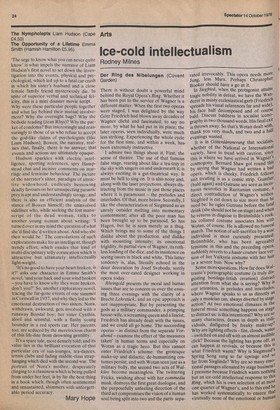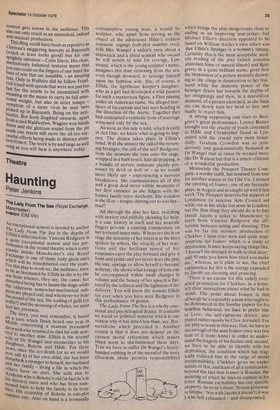ice-cold intellectualism
Rodney Milnes
Der Ring des Nibelungen (Covent Garden) There is without doubt a powerful mind behind the Royal Opera's Ring. Whether it has been put to the service of Wagner is a different matter. When the first two operas were staged, I was delighted by the way Gotz Friedrich had blown away decades of Wagner cliche and fascinated, to say no more, by what he had put in its place; the later operas, seen individually, were much less striking. Experiencing the whole cycle for the first time, and within a week, has. been extremely instructive.
I admire two things about it. First, the sense of theatre. The use of that famous false stage, rearing about like a tea-tray in the sky with singers on and underneath it, is always exciting in a gut-theatrical way. It must be hell to sing on. It is also noisy and, along with the laser projections, always distracting from the music in just those places where it is paramount — the preludes and interludes. Of that, more below. Secondly, I like the characterization of Siegmund as an unruly outsider melting into momentary contentment; after all the poor man has been brought up to be paranoid. So has Hagen, but he is seen merely as a thug. Which brings me to some of the things I dislike about the production, and dislike with mounting intensity; its emotional frigidity, its partial view of Wagner, its ruthless loading of the dice, and its insistence on seeing issues in black and white. This latter tendency is, alas, literallY echoed in the dour decoration by Josef Svoboda, surely the most over-rated designer working in opera today.
Rheingold presents the moral and human issues that are to concern us over the ensuing three evenings with the clarity of a Brecht Lehrstack, and an epic approach is not inappropriate. But by presenting the gods as a military commander, a primping house-wife, a screaming queen and a fascist, Friedrich has already dealt with the issues, and we could all go home. The succeeding operas — as distinct from the separate Vorabend — examine the effect of 'the measures taken' in human terms and especially on Wotan as a tragic hero. But this cannot enter Friedrich's scheme: the grotesque make-up and didactic, de-humanizing costumes persist, and with Wotan seen just as a military bully, the second two acts of Wal/care become meaningless. The twittering Fricka, swishing about with her commedia mask, destroys the first great duologue, and the purposefully unfeeling direction of the third act compromises the vision of a human soul being split into two and the parts sepa rated irrevocably. This opera needs more gless Marx. Perhaps Christopher Jung, should have a go at it. In Siegfried, when the protagonist attains tragic nobility in defeat, we have the Wanderer in musty ecclesiastical garb (Friedrich spreads his visual references far and wide), his face half decomposed and of course bald. Discuss baldness in socialist iconograph), in two thousand words. His final exit is thrown away. So that's Wotan dealt with thank you very much, and two and a hale evenings wasted.
It is in Gotterdeimmerung that socialists, whether of the National or International varietY, have to tread with caution, since this is where we have arrived in Wagner.5 cosmogony. Bernard Shaw got round this by saying that Wagner had written a bad opera, which is cheeky. Friedrich folloWs suit treating is as a comic strip. Gunther (bald again) and Gutrune are seen as incestuous neurotics in Ruritanian costume, a direct contradiction of Wagner's wishes. Siegfried is cut down to size more than he need be: he ogles Gutrune before the fatal drink (she should not be on stage) and when he returns in disguise to Briihnhilde's rock, his collared costume associates him with Wotan, of course. He is allowed no funeral march. The notion of self-sacrifice by a wise individual is most curiously presented; Brannhilde, who has been agreeablY feminine in this and the preceding opera' suddenly reverts to a haute couture lace vet' on of her Valkyrie costume with her half in a severe bun. Now why? Some morequestions. How far does %Val" traute's pornographic costume (a truly dlsgusting bondage-fetish creation) distract attention from what she is saying? Why 15 our attention, in preludes and interludes. where Wagner speaks to us as directly as only a musician can, always diverted by stage action? At two emotional climaxes in the funeral music something happens on stage to distract us: is this intentional? Why are s,? many characters, drawn in depth as indl; viduals, disfigured by freaky make-UP' Why are lighting effects —fire, clouds, water —switched on and off with an almost audible click? Because the lighting has gone off, as can happen at revivals, or because this 1,s what Friedrich wants? Why is Siegmund 5 Spring Song sung so far upstage and 50 far from Sieglinde? Why are so many emo: tonal passages alienated by stage business I presume because Friedrich wants nothing but an ice-cold intellectual response to this Ring, which his is own selection of at most one quarter of Wagner's, and to this end he has worked systematically to ensure that virutually none of the emotional or hurnarl content gets across to the audience. This aim can only result in an unmusical, indeed anti-musical production. This Ring could have been as repulsive as Chereau's sniggering travesty at Bayreuth (which at least looks good) but for one Sprightly saboteur — Colin Davis. His clear, meticulously balanced textures mean that You can count on the fingers of one hand the lines of text that are inaudible — an amazing feat. Only in Walkiire did he follow Friednch's lead with speeds that were not just too fast for the words to be enunciated with meaning or the music to carry its full emotional weight, but also in strict tempo — symptom of a nasty virus he may have Picked up in Bayreuth. Bring on the antibiotics. But from Siegfried onwards, apart from a cool Waldweben, Wagner won hands down and the glorious sound from the pit made one resent still more the all too successful efforts being made to distract attention from it. The work is by and large as well sung as you will hear it anywhere today.



































 Previous page
Previous page